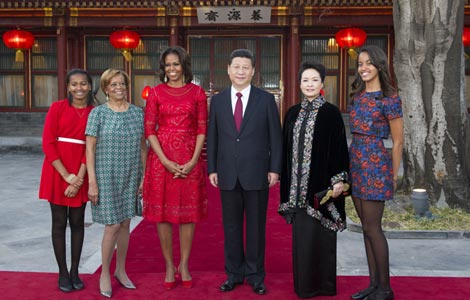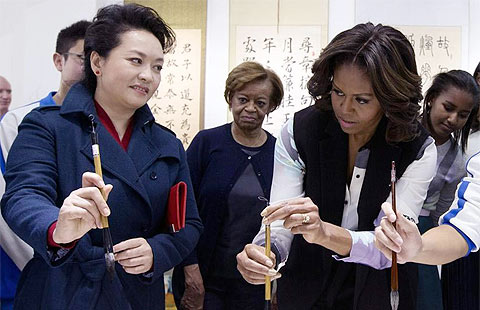Career women in China take charge
Updated: 2014-03-24 08:26
By He Dan (China Daily)
|
||||||||
Nation has high percentage of executives and managers in global study
Women are making their mark in the Chinese business world, as a recent survey shows the country is one of the top 10 in the world in its percentage of women board members.
In addition, women in China hold more than a third of company management positions, according to the survey released by Grant Thornton International, a leading global accounting organization.
Women occupy 21 percent of the positions on company boards in China, beating the global average of 17 percent, said the survey, which ranked China ninth among 44 polled countries.
Thailand topped the list with 37 percent, followed by the Philippines at 31 percent. Italy and Russia tied for third at 29 percent.
In addition, women hold 38 percent of corporate senior management positions in China, compared with 24 percent globally, the survey revealed.
The survey polled 6,700 companies worldwide, including 200 from the Chinese mainland, said Dominic King, Grant Thornton's global research manager.
King added that the survey also showed that State-owned enterprises have a better record than private and foreign companies in China for placing women in senior positions.
The concept of "opportunity for all" is deeply embedded in Chinese society and has boosted gender equality, he said. Rapid urbanization, which allows more women to work, plus reduced child care burdens stemming from the family planning policy also are factors, he said.
Jiang Yongping, a researcher at the Women's Studies Institute of China, said she agrees with King's views, adding that the family planning policy in urban areas also ensures that girls get equal access to education and other resources.
Jiang said society has shown growing confidence in women's management skills, and women leaders are often regarded as more considerate and caring when compared with male leaders.
But although China has achieved remarkable progress in breaking the glass ceiling for women in business, it still lags behind in terms of providing sufficient support for career women.
Only 30 percent of companies on the Chinese mainland allow flexible working hours for career women with children, compared with 63 percent of companies worldwide.
Less than a third of Chinese mainland employers provide extra unpaid holidays apart from maternity leave for career mothers, a figure lower than the global average.
The survey also found that only 15 percent of businesses on the mainland provide training programs that facilitate a path for female employees to senior executive jobs.
Nearly seven in 10 companies admitted they never considered tailored training workshops for women employees.
Kathleen Chien, chief operating officer of 51job.com, a major recruitment website in China, said it is important for women to seek help when they need it, both at home and in the workplace.
"A lot of women try to take on too much at the same time without asking for help. They are often embarrassed or feel guilty about asking for assistance or special treatment.
"I think in this day and age, most employers are willing to make accommodations to help as much as possible if that ultimately allows them to retain good talent," she said.
More workers have women bosses: survey
Eighty percent of employees have female bosses in 2014, an increase from 68.3 percent in 2013, a recent survey showed.
The poll, conducted by 51job.com, a human resources provider in China, interviewed 3,961 employees, of whom 58.4 percent were male and 41.6 percent female.
However, only 8.5 percent of women held positions on the board of directors and less than 4 percent became chairwomen.
The survey also found that more male employees, 59.6 percent, respected their female bosses.
Only 45.8 percent of female respondents said they respected their female boss and 16.6 percent said they disliked them, two times higher than their male counterparts (8.8 percent).
More than 40 percent of female respondents said they wanted an "easygoing and practical" female boss, followed by "gentle and wise".
Meanwhile, about 39 percent of male respondents preferred an "easygoing and practical" female boss, over "smart and competent" or "resolute".
- Fan Feifei
hedan@chinadaily.com.cn

 Obamas climb Great Wall after lunch of trout
Obamas climb Great Wall after lunch of trout
 US first lady shows character during maiden visit to China
US first lady shows character during maiden visit to China
 Icebreaker heads for southern Indian Ocean for missing jet
Icebreaker heads for southern Indian Ocean for missing jet
 A long musical journey to Carnegie Hall
A long musical journey to Carnegie Hall
 Balancing an egg on end during vernal equinox
Balancing an egg on end during vernal equinox
 Los Angeles County Air Show
Los Angeles County Air Show
 Don't need a bed to sleep tight
Don't need a bed to sleep tight
 Peng Liyuan meets with Michelle Obama
Peng Liyuan meets with Michelle Obama
Most Viewed
Editor's Picks

|

|

|

|

|

|
Today's Top News
From school dropout to universal appeal
Studying abroad remains vital ingredient of US foreign policy
Obamas climb Great Wall
First lady takes in some Peking Opera
Xi begins key Europe visit
US first lady shows character during visit
Xi sets off on first European tour
Beijing beefs up hunt for missing jet
US Weekly

|

|







